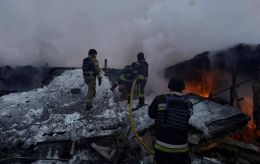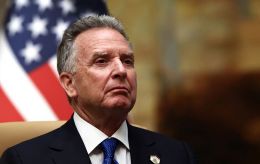Ivan Preobrazhensky: Putin understands that if he starts nuclear war, he’s not going to survive
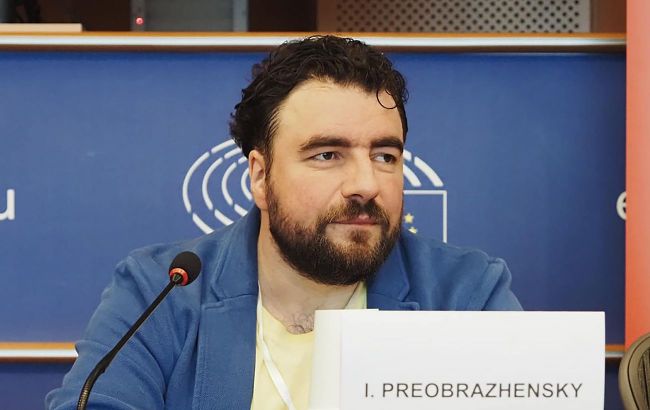 Ivan Preobrazhensky (photo: Facebook)
Ivan Preobrazhensky (photo: Facebook)
In an interview with RBC-Ukraine, Russian opposition political analyst Ivan Preobrazhensky discusses the nature of Russian society, why Russians do not oppose the war, whether a revolution in Russia is possible, who Vladimir Putin is and what his plans are, and if Russia will ever apologize to Ukraine.
Ivan Preobrazhensky is a Russian political analyst in opposition. In 2014, he emigrated from Russia to Czechia, the day after Vladimir Putin signed the decree on the annexation of Crimea into Russia. At that time, he had a choice: work for the presidential administration or resign.
Preobrazhensky decided there was no point in staying in Russia, as the situation was worsening and threatening to become dangerous. His circle of colleagues and technocrats largely supported the Kremlin’s decision. "To their credit, they convinced me that war was inevitable because Russia’s ambitions went beyond the annexation of Crimea," says the political analyst. Nevertheless, Preobrazhensky continues to keep a close watch on the processes unfolding within Russia.
To make it more reader-friendly, the editorial team has published a shortened version of the conversation, featuring direct quotes and paraphrased sections from Preobrazhensky.
Opponents, collaborators, and passive masses – what is happening in society?
Today, in the third year of Russia’s war against Ukraine, Russian society remains largely silent. Protests, which flared up at the beginning of the full-scale invasion, quickly died down, and the few war opponents were severely punished. The majority of society is made up of people who essentially do not care about the war.
Shock quickly gave way to indifference. Furthermore, when Ukraine began to retaliate, many Russians, who previously had no stance on the war, started to show aggression toward Ukrainians. This was evident after the shelling of the town of Toropets, where an ammunition depot was located. On social media, Toropets residents urged their authorities to strike Kyiv with nuclear missiles.
Is this a lack of cause-and-effect understanding, or is it some general resentment?
"Yes, you understand it correctly, it's a breakdown of cause-and-effect reasoning. In general, what’s happening in Russia after the establishment of Putin's totalitarian regime is precisely a result of this disruption, a social phenomenon that has emerged in Russia.
This is the same situation now. It can be compared to the beginning of the full-scale Russian aggression when it was clear to everyone that it was an unmotivated attack with no justification. Most Russians were inclined to think, 'Yes, maybe Putin understands why he’s doing it, but we don’t.' But gradually, the cause-and-effect chains broke down due to the war.
As people started dying, Russians saw that their compatriots were being killed, and a new motivation emerged - 'for our boys.' This motivation grew stronger, and by 2023, it became the main one, especially for those fighting or part of the Russian occupation army.
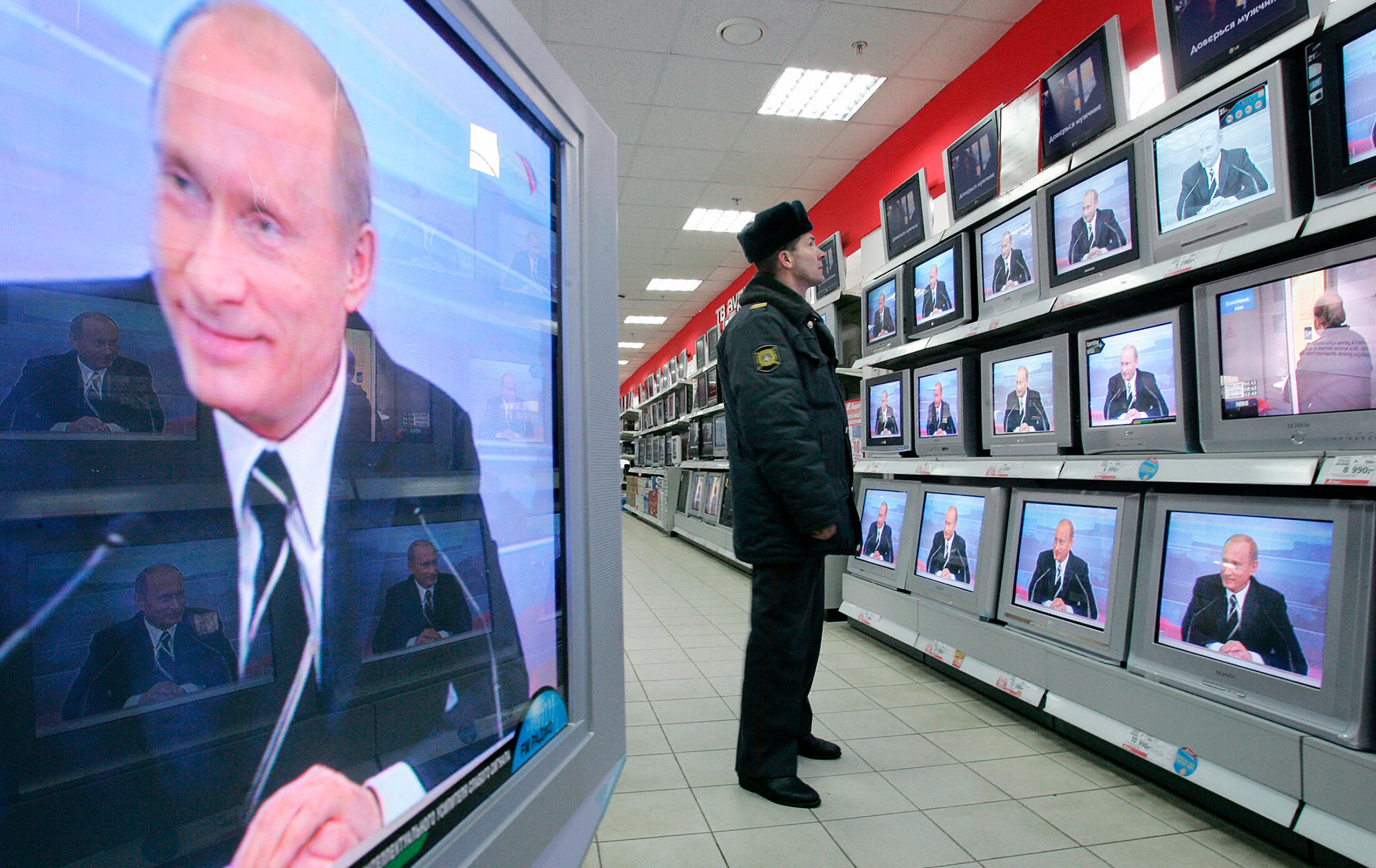
Russian propaganda on TV (photo: Getty Images)
Russians are essentially acting in reverse - they may not know what led to this, but they know someone like 'Vasya' was killed, and now they are avenging Vasya by killing Ukrainians. This can be explained by an old Russian saying, "Ivan who does not remember kinship," but in this case, it’s the opposite - kinship is fine, but the memory of how it all started is completely cut off".
According to Preobrazhensky, the reason why Russians are actively resisting any thoughts about the war lies in their unprocessed totalitarian past, which Russian society never overcame. As a result, there is a suppression of negative emotions and a refusal to take responsibility. "They don’t apologize for what happened. You could sum it up with the phrase, ‘Sorry, man, it turned out bad.’ That’s their reaction to any problem as if it came out of nowhere," says Preobrazhensky.
Many Russians don’t believe they are responsible for what’s happening. This sentiment is shared by both the passive population and many opposition figures who oppose the war. "But the responsibility still lies with us - as Russians - simply because this happened," says the political analyst.
Most Russians are convinced that they cannot influence the situation. This belief stems from the feeling of helplessness the average Russian citizen feels when confronted with the "big totalitarian machine."
"And then something strikes the building next to me. I’ve gotten used to it; it’s been 2.5 years, and I’ve suppressed the understanding that there’s a full-scale war happening somewhere far away. In the first months, I - an average Russian - was concerned, but then I completely forgot that 20 kilometers away, the Russian army was killing people.
Suddenly, the war reaches me. Naturally, no reflection kicks in. Who hit me, Ukraine? I hate Ukraine, I hate Ukrainians. Now I understand why they were bombed - because they started bombing me."
Preobrazhensky estimates that the core group supporting the war makes up about 15-17% of the Russian population. This number has fluctuated depending on the situation at the front. Around 15% are categorically against the war, some of whom have fled abroad. "Because of this, this group initially shrank to around 10% by 2023. Then it expanded due to the breaking of psychological barriers when the war reached people’s homes. These could be the wives or relatives of mobilized soldiers or mercenaries killed in Ukraine."
Opposition to the war primarily comes from younger generations, who understand that their future in Russia is increasingly resembling life in North Korea. Regional elites, who built their careers on corruption and had no democratic inclinations but enjoyed sending money to France or England, were also caught off guard when their survival strategies were abruptly taken away, says Preobrazhensky.
The majority of Russians, around 70%, are indifferent to the war. To outsiders, these Russians appear to support the war because they do not protest. But on their level, when faced with a choice, they often choose the lesser evil to avoid putting themselves at risk. "This is the same kind of teacher who starts reading a course on 'Important Stories,'” the analyst adds.
However, these people are aware of what’s happening and know that Russia attacked Ukraine, but they are not prepared to do anything about it.
If they understand everything, why do they blame us when a missile hits them?
"Because they fundamentally refuse to confront anything that might force them to act or oppose this unjust war. You understand that people are being killed next to you unjustly. If someone were being murdered in the apartment next to yours, you’d probably try to save them. The same logic applies here. You should try to stop the war. But you don’t see any tools to do so safely.
You’re convinced that if you protest, you’ll be jailed for 5-7 years, and I won’t achieve anything. And that’s true. But to understand that there are more complex ways to fight, you need to realize that the world is more complicated and have social connections where someone might suggest that you could help Ukrainian refugees or deported Ukrainians. You could help find Ukrainian children who were deported to Russia, and for now, you probably won’t be jailed for that.
You could help sociologists or independent journalists by providing information. Or you could simply not do any harm. You could minimally sabotage certain actions by the authorities at your workplace. You could try to expand your circle of reasonable people, carefully find those who think like you, and form support groups.
But these are more complex actions, and most people are not ready for them after an initial emotional outburst. So what happens? There’s this emotional surge, and then I either have to act, or I choose the simplest response: anger at the Ukrainians.
If someone nearby was brave enough, despite the risk of denunciation, to say, 'Are you out of your mind? Look at this video. Remember that your grandmother is from Zhytomyr, or your grandfather is from Kyiv,' the person might at least be silenced. But there’s simply no one around to say that," explains the political analyst.
Is there a chance of a Russian revolution?
A small number of Russians tried to protest in the early days of the full-scale war, holding signs reading "No to war" and calling on the government to stop the invasion. The government responded by harshly suppressing protests and continues to crack down on those who oppose the war.
However, the number of people willing to protest is critically low. Ukrainians initially urged Russians to take to the streets en masse. Today, with the average Russian citizen accustomed to the war, it no longer serves as a trigger for protest. Some believed that perhaps repression would become the trigger, pushing people to protest when they had no other choice. However, according to Preobrazhensky, a revolution in Russia is only possible under specific conditions.
"As we can see, Russian society swallows seemingly intolerable things again and again. Social explosions happen when, often for unclear reasons or unpredictable coincidences, what’s called a 'point of collective action' arises. Suddenly, many people realize that they can influence what’s happening here and now.
It’s not that things are so bad that they can’t live anymore, so they rush under a tank. It will happen when they suddenly have even a minimal hope that they can stop the tank. These points usually arise when there is a disconnection between political power and the security forces, and the security forces take a pause and do not fulfill their duties," Preobrazhensky concludes.
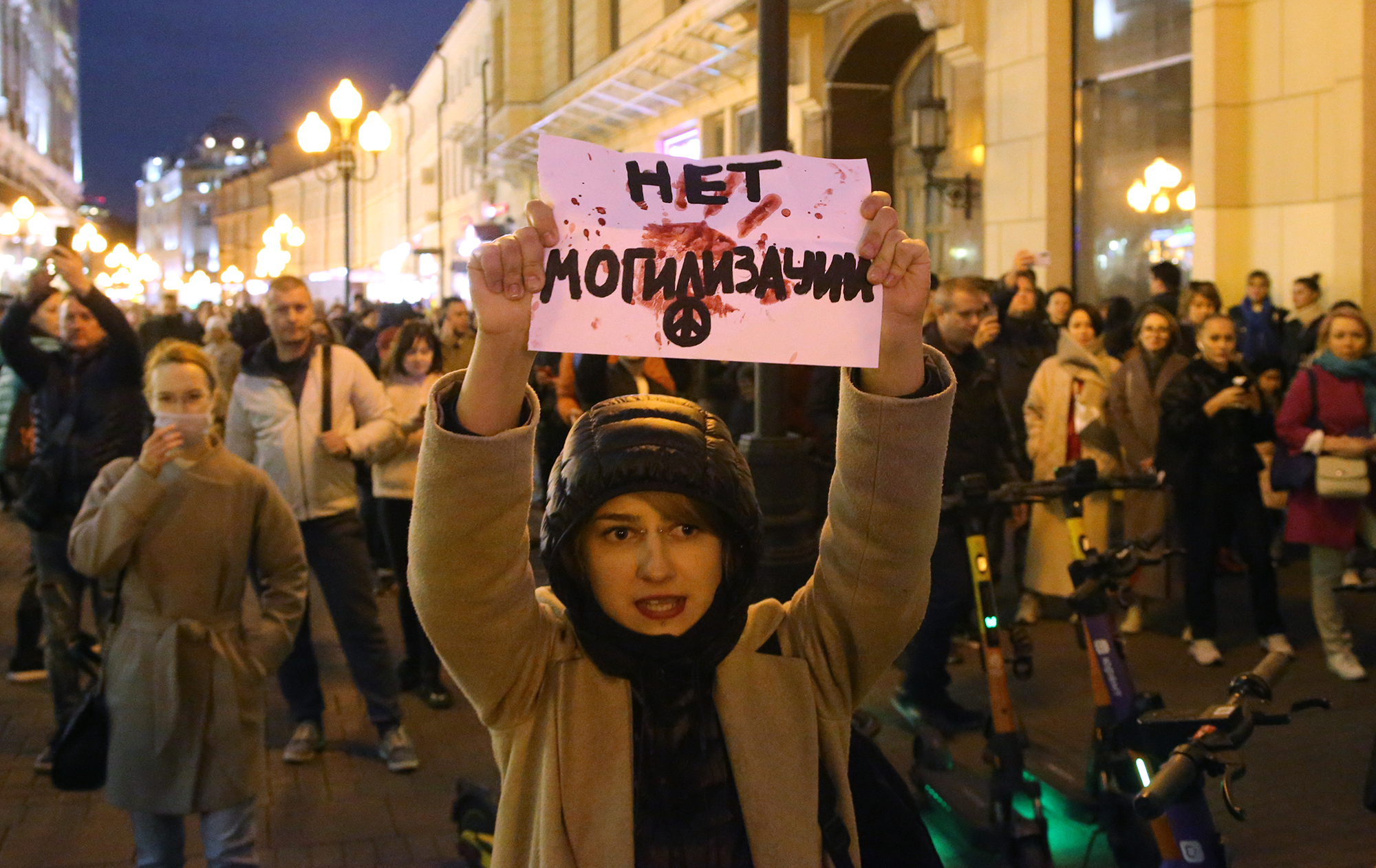
Rallies in Moscow in September 2022, after the start of mobilization (Photo: Getty Images)
One of the key points of collective action was the "march" of Yevgeny Prigozhin, who was immediately supported by Russians in the cities where the "Wagnerites" entered. This is why Putin promptly traveled to Dagestan - analysis of social media showed that Prigozhin had significant support there.
One of the most likely points of conflict, according to Preobrazhensky, is a clash between the Kremlin and one of the regional elites. Recently, mid-level businesses have been under pressure. "Putin's crony Medvedchuk, a former Ukrainian citizen, moved to Russia and has already acquired a business worth several billion. One investigative journalist reported that these billions were seized from Russian mid-level businessmen," says the political scientist.
Putin himself gave governors the power to create volunteer battalions and assemble military formations. A situation could arise where law enforcement officers show more loyalty to local leadership and side with them. Such a scenario occurred in Bashkortostan, where the police, for a while, did not stop protesters.
"Revolution must be about future generations and archaically about the land where our children are supposed to live. When these two factors come together, a protest emerges, even though people understand that it will be suppressed. In Bashkortostan, by the way, it wasn’t immediately suppressed, as the police live here themselves and react similarly to the majority of the population," the political scientist explains.
The situation in the Kursk region could not independently become a point of collective action, although any mention of Kursk evokes negative feelings among Russians toward their government and Ukraine.
"What do we see? We see a spontaneous reaction like, 'That's it, let's punish the Ukrainians.' However, during well-thought-out surveys that reveal the true attitude toward this, we see that this is a potential flashpoint. Could it become a point of collective action? Not on its own. Clearly not, because it’s unclear how to resolve this problem."
Who is Putin, how does the West view him, and who fears the nuclear button?
According to Preobrazhensky, the farther Western countries are from Ukraine, the fewer refugees they have, and the more they perceive the conflict as a regional military conflict. A severe and unacceptable one for Europe, but still a regional one without the tendency to expand.
The farther west from Ukraine, the less politicians believe that Putin is a threat not just to one country but to Europe as a whole. And if they don't believe in the threat, they assume Putin lacks the resources for a war against Europe. Many Western diplomats and politicians held this belief even before February 24, thinking that Putin didn’t have enough resources to occupy and hold Ukraine. This belief didn't stop the Russian army from starting a war, one of the goals of which is the destruction of the country as a whole.
"In normal circumstances, you have to understand that you're dealing with a maniac, with his own very clearly constructed schizophrenic logic, but a maniac who lives in a completely different reality from you. But it’s difficult for most people to accept this, and most people tend to explain others' actions through their own motivations. Accordingly, they think that, rationally, they would use nuclear weapons in this situation."
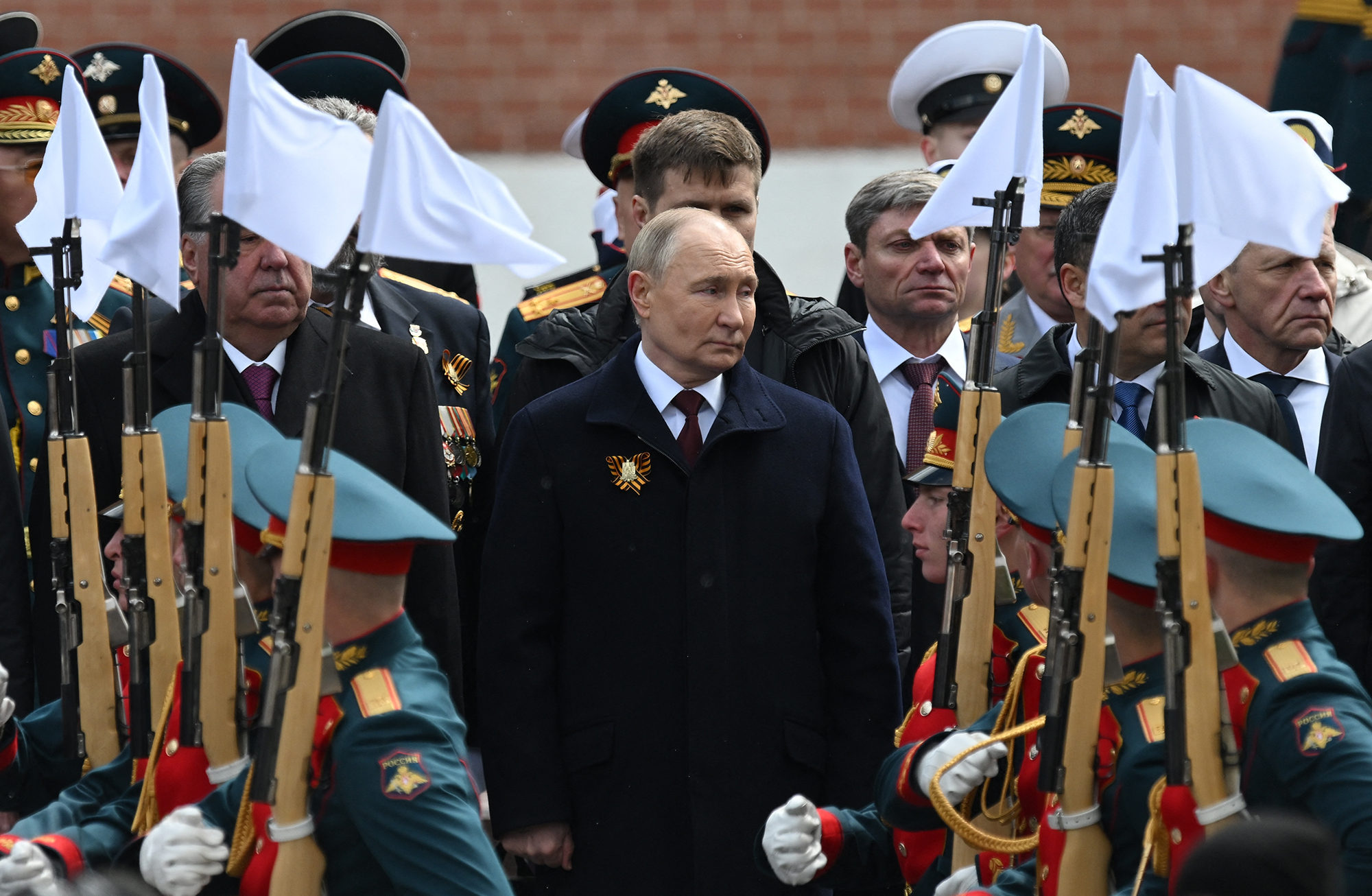
Vladimir Putin (photo: Getty Images)
"Actually, when I talk to my Western colleagues, I ask - why didn't Russia use nuclear weapons in 2022 when there was a chance they would lose? They say Russia didn’t use nuclear weapons because they were confident they wouldn’t lose. No, that’s clearly not true. They didn’t use nuclear weapons because they’re afraid to. Everything Putin does is aimed at keeping himself in power in Russia and, if possible, fulfilling what he sees as his historical mission: creating a new gigantic space where Russia would have influence."
"But he values his own life far more than the lives of not just Russians and Ukrainians, but also Russia and Ukraine themselves. He’s rational enough to understand that if he starts a nuclear war, he’s likely not going to survive. And all those bunkers in Altai, for example, clearly aren’t enough. It’s not enough to be 100% sure that he will stay alive," says Preobrazhensky.
Therefore, Western politicians either make one mistake or another - they either consider Putin too rational, like them or see him as a madman with his finger on the nuclear button. By the way, Putin actively tries to fit the second image. And some politicians lean toward negotiating with terrorists until a gun is pointed at their head.
"As a result, a mistaken, unequivocal situation arises - the number of people who have dealt with people like Putin is minimal, and they cannot influence decision-making strategically. To put it simply, if, for example, NATO were run by someone who had experience fighting crime in a big city and had dealt with thugs like Putin many times, they would know how to act. The only thing this type understands is power, extremely hard power, clearly indicating a readiness to use it under any circumstances, and applying that power when necessary without hesitation," says the political scientist.
Also, Putin plays on the emotions of politicians who grew up during the Cold War and feel a real fear of a nuclear strike. According to Preobrazhensky, had it been made clear to the Kremlin in 2014 that any interventions in foreign countries would not be tolerated, the full-scale war would not have happened.
In his worldview, Putin likely sees himself as the savior of Russia and the entire civilized world. This narrative can be traced back to 2005. At the time, Russia was not as strong as the Soviet Union, and its economy cannot compete with the American economy as it could during the USSR.
"He believes that the Soviet government mismanaged the country after Brezhnev, at least. Then came Andropov, whom he greatly admires, who tried to save the situation, but after that, all those 'liberal weaklings' ruined the country. As a result, Russia began to lose even faster. People like Sergey Glazyev - a pseudo-economist - and others of his type love to talk about how a new technological revolution is underway, a new technological order is being created. If Russia doesn’t keep up, it risks becoming a Third World country, and then it will inevitably be torn apart."
"And this will be a greater tragedy than the collapse of the Soviet Union because it will come with bloodshed and cause instability across Eurasia. China will rise and start pressuring the Western world. In general, Western civilization will perish, so to speak. Thus, Putin sees himself as the savior of Western civilization. A messiah. Essentially, the Jesus Christ of our time. And for such great goals, of course, it’s permissible to kill a million people," says Preobrazhensky.
At the same time, Putin is an active fan of various semi-conspiratorial theories, one of which claims that Russia cannot revive the empire without Ukraine. Meanwhile, the Russian dictator sees that Ukraine is increasingly choosing its own path, which clearly does not lie in friendship with Russia. Moreover, Ukraine is reviving its authenticity and national consciousness.
"That’s why he is so fixated on the Russian language. Ukrainian bilingualism infuriates him. In fact, bilingualism annoys him more than actual Ukrainization, because he wants there to be strictly Russian speakers and strictly Ukrainians - then he can 'save' the Russian speakers. But when they start speaking Ukrainian, it irritates him. He doesn’t want there to be two languages in this space. He doesn’t want cultures to mix. He wants Russian, not Ukrainian," says the political scientist.
This is why the Kremlin is deeply irritated by Ukraine's fight against communism, especially the removal of monuments to Vladimir Lenin. "By the way, there was a joke in the Soviet Union that Lenin was actually a mushroom. So all these Lenins are part of a mycelium that grew in the Soviet Union. The mycelium ruled the country."
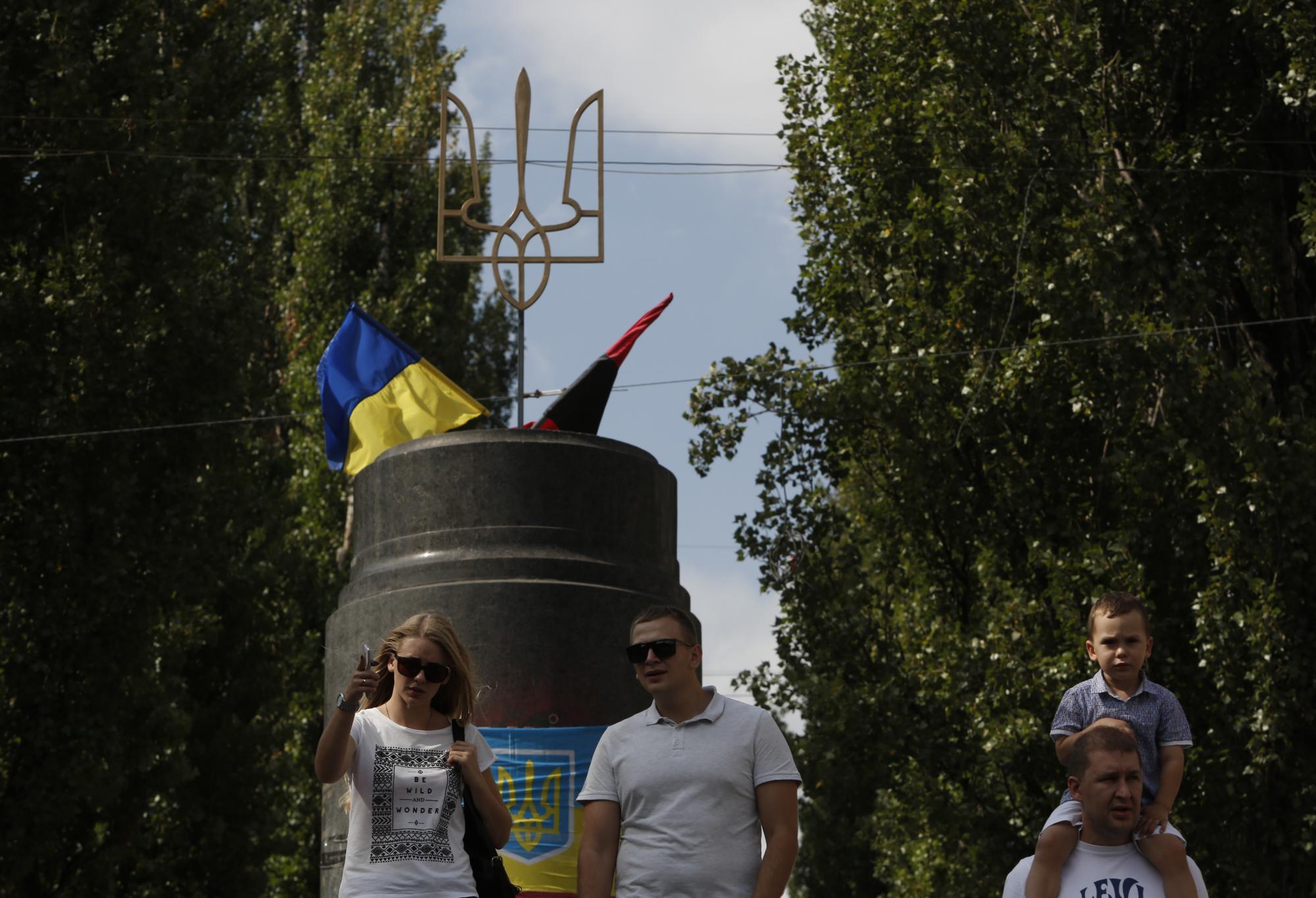
The pedestal on which the monument to Vladimir Lenin used to stand (photo: Getty Images)
The West itself, as cynical as it may sound, isn't too concerned about what Russia is doing to Ukraine. Many European countries have their own interests in other areas, and Ukraine is not at the top of their agenda. Therefore, foreign policymakers are guided by a simple pragmatic rule: fight only when peace becomes more costly than war.
"In 2022, it became clear that the peace that could have been maintained after Russia's full-scale aggression against Ukraine became more expensive for Western democracies in every sense - politically and economically - than war. The war turned out to be cheaper, and Western democracies began to actively help Ukraine.
Now the situation is such that for them, the aid is becoming more expensive. And they are already doubting what’s cheaper. So, they might try to create a bad peace again. It’s also expensive, but what if it turns out to be cheaper than the current war? This doesn't mean that they are 100% inclined, as many think, to offer a conditional Scholz statement right now. But there is this wavering and an attempt to find that equilibrium point where they can exist more comfortably," Preobrazhensky said.
Two factors could radically influence Western support for Ukraine - if Putin demonstrates that he has interests beyond Ukraine, specifically inside the European Union, or if the West sees a quick Ukrainian victory as possible. Unfortunately, this is unlikely due to a lack of resources, even if more are added.
Negotiations are beneficial for Putin. According to the political analyst, he does not intend to stop the war but sees that he is succeeding in pushing the negotiation agenda, opening up numerous opportunities for him.
"If he manages to gain control over Kherson, great. Or if he can secure a demilitarized zone in the Kharkiv region or at least force Ukraine, under Western pressure for negotiations, to withdraw troops from the Kharkiv region? Fantastic.
Or, conversely, through negotiations, considering that Ukraine occupies part of the Kursk region and holds the gas distribution station in Sudzha, will he be able to maintain gas transit through Ukraine? Also fantastic. He needs money. In short, he has countless possibilities. Any shift toward negotiations is a plus for him. Any slowdown now, when he has again lost the initiative on the front, is essentially a plus for him.
I think he hopes that Ukraine will gradually be forced to cease fire, he will quickly capture the part he's been trying to seize for the past few months, and then he will pause and negotiate over how Kherson and Kharkiv will be handed over to him. It's not even that - first, he needs Kherson and Kharkiv to be handed over, and then he'll be ready to negotiate. Essentially, return to us what we consider Russian territory. It's quite telling, by the way, when he referred to the residents of Zaporizhzhia - meaning the non-occupied city - as Russians. It turns out it's no longer terrifying that the Kursk region is being bombed. Russians are being bombed there and here. So, what's the difference?" added Preobrazhensky.
What will happen to Russia if Putin dies tomorrow?
If Putin dies tomorrow, there will be a conflict among the ruling elites in Russia. But with a 70% probability, one of the existing clans will seize power after this conflict, eliminating some factions and negotiating with others. The Russian regime, which has essentially become totalitarian, will revert to authoritarianism. The new regime will try to restore relations with the West, without abandoning any conquests made under Putin, but they might try to reset the situation and declare that it was all under Putin, and now it's time to start negotiating.
"They won’t pay any reparations, they might symbolically hand over one oligarch to a Western court, as Serbia did after Milošević. This would follow a scenario similar to Serbia's, but without a Zoran Djindjic, who was assassinated shortly afterward. So, no, democracy won't come even for a brief time. It will just be an authoritarian landscape, very similar to many Central Asian countries," Preobrazhensky said.
This is because, for Russia to fully change its developmental course, something more significant than Putin's death is required. One such upheaval would be a military defeat. If this doesn't happen, after the dictator's death, the factions will start their struggle.
"There is a relatively large faction centered around Moscow Mayor Sergey Sobyanin. He is often painted as a liberal in the West, but in reality, he's part of the Kogalym criminal clan. It’s just St. Petersburg gangsters versus Kogalym gangsters. There are at least two large factions from Putin's inner circle. These are the so-called Kovalchuks, working alongside First Deputy Head of the Presidential Administration Sergei Kiriyenko - who oversees the occupied territories and Rosatom and is very influential.
The second faction is the Russian military-industrial complex, including Sergei Chemezov and First Deputy Prime Minister Denis Manturov. There are many people around them. Most likely, new Putin aide Alexei Dyumin, a former governor and former military special forces operative, will join them. He likely personally led the operation to evacuate Yanukovych from Ukraine.
Then there's the so-called security faction, like Ramzan Kadyrov. Fully loyal to Putin today is Viktor Zolotov, head of the National Guard and former head of Putin's security, who has very good relations with Kadyrov. But if they don't align with major economic clans, they won’t be able to seize power," Preobrazhensky said.
The war will likely end or significantly stall. This is because Putin views this war ideologically and attaches a personal meaning to it. New leaders will want to build relations with the West, as they understand that a war economy cannot exist forever. The war must end to do this. However, they are unlikely to return any of the occupied territories.
Is a 'beautiful future Russia' possible?
"I don't believe in a 'beautiful' Russia in my lifetime. I do believe in a future Russia that gradually restores some democratic institutions and undergoes the 30-40-year transformation it needs. And I think this transformation may even be faster. But certainly not in 5 or 7 years, as some Russian opposition figures suggest. Like, we'll go back to Russia, hold the first democratic elections in a couple of years, and five years later, Russia will be a normal democratic country. No, the trauma inflicted on Russian society, even in just the last two and a half years, won't heal that quickly.
It's very hard to imagine that the imperial syndrome can be cured quickly. The question is simply that the world has no choice but to support Russia's gradual transformation. No tool can just erase Russia from the map and allow the world to live normally and peacefully again."
According to Preobrazhensky, the collapse of Russia is impossible. Today, national regions, especially those on the periphery of Russia, aren't considering secession. Except for a few regions like Dagestan or Yakutia, national consciousness has been actively suppressed and no longer arises.
"You have to understand that there’s the so-called Karabakh conflict. Now it’s more or less over because Azerbaijan cleared out Karabakh, and those who were in conflict there are gone. But even now, you can’t say 100% that it’s completely over. What if at some point in Armenia, there are attempts to restore control over Karabakh and return it to the historical Armenian settlement zone?
All of this is a result of the Soviet Union's national policy, which consciously drew borders in such a way that they laid the groundwork for future national conflicts if the country ever began to fall apart. Inside Russia, everything looks the same. A war between Bashkortostan and Tatarstan is a completely real possibility if one of these republics tries to agree to sovereignty," said the political scientist.
According to Preobrazhensky, Bashkirs are the third largest nationality in Bashkortostan. In neighboring Udmurtia, there are Tatar enclaves, and in the Orenburg region, there are Bashkir ones and quite large ones at that. Accordingly, any division would automatically lead to inter-ethnic conflicts.
The imperial mindset of many Russians will die out only if imperial realities die out. If Russia becomes a national state again, not an empire, this might happen. During the collapse of the Soviet Union, this option was proposed by national democrats - cut off the republics and make Russia a country "just for Russians." It would have been a great option, but it didn’t happen. The problem was that they were easily blocked by Russian imperialists. For example, already in 1992-1993, they, supposedly advancing this agenda, supported the "return" of Crimea," said the political scientist.
Will Russians ever apologize to Ukraine?
"Current residents of Russia are unlikely to recognize their guilt towards Ukraine. Therefore, there’s no one to apologize. For that to become possible, a generation must change, at least from those who committed crimes to those who, either due to age or ideology, did not. Moreover, the new generation must grow up with an understanding of guilt for past crimes and a sense of responsibility that requires them to do something to compensate for those crimes," said the political scientist.
Does Russia today even need a new leader? Is it ready for one? Do those living in Russia today deserve better, considering these same Russians brought Putin to power and allowed him to hold onto it for 20 years?
"It's a complicated question. On the one hand, you're right - Russian society did a lot to ensure that Vladimir Putin stayed in power. And at the same time, after the collapse of the Soviet Union, Russia became part of the international community, and unfortunately, the international community also did a lot to ensure Vladimir Putin's continued rule.
So, do they deserve better? It’s not really a difficult question for me. My stance is not from a Russian perspective, but from a Christian one. Everyone deserves better. And here, it’s important that in receiving something better, Russia ceases to be a threat to its neighbors. It’s obvious that without achieving better conditions, Russia will continue to be a threat to those around it.
This is a matter of security for Ukraine, Belarus, Kazakhstan, and all other neighboring states - to transform Russia into a non-aggressive state. Russia can only become a non-aggressive state if the lives of Russians themselves are secured, if the value of life within Russia increases, and if these people stop going off to die for money they would never have earned through honest work, and stop killing Ukrainians in the process.

Ivan Preobrazhensky (Photo: Facebook)
And if we try to punish them - truly punish them - you’re right in that, on one hand, it’s completely understandable why this punishment would happen. The punishment will happen, and it will be legitimate, but inevitably, it will lead to a new sense of resentment. Whether they will have the capacity to manifest that resentment as inhumanely as they do now, or whether the Russian economy will collapse, is another question. Even North Korea, in its economic state, can still pose a threat.
I understand and largely share the anger and the sense of moral responsibility for what has happened. I just don’t see any possibility of transforming Russia into a safe space for its neighbors without also transforming it from within. Essentially, "Upper Volta with rockets" will always pose a threat to everyone around it, even if you take away the rockets. The problem isn’t just disarming them; it’s turning them into something other than "Upper Volta." The same sort of denazification that was carried out in Germany would be needed. Who would carry that out? That’s another question.
So... This is a problem that, in my opinion, Ukrainian society will also have to deal with, unfortunately. Because the noble and absolutely justifiable feeling of wanting revenge is something that, for example, the French had toward the Germans, and the Soviet society had toward Germany after World War II. And these problems were resolved one way or another.
This war isn’t just about who wins on the battlefield. It’s about who will change the other. Either a democratic Ukraine will succeed in collapsing Putin’s Russia, removing its historical threat, or Russia will turn Ukraine into a similarly totalitarian state, even if Ukraine remains independent. That is the core issue."
